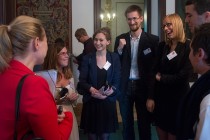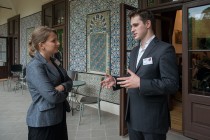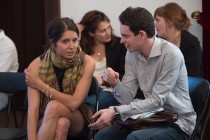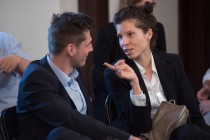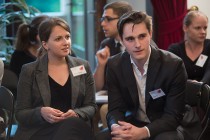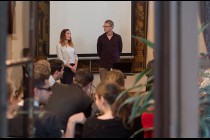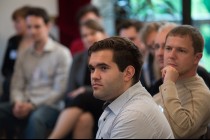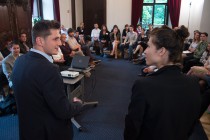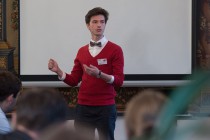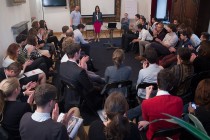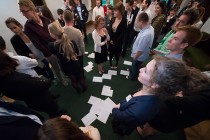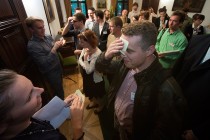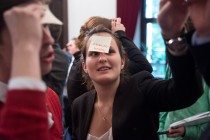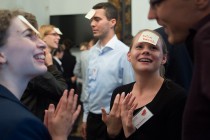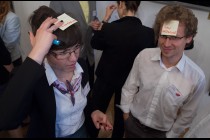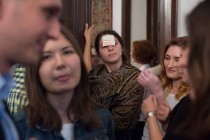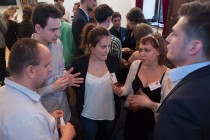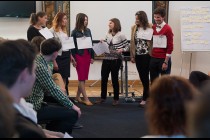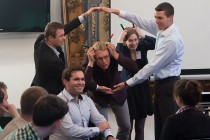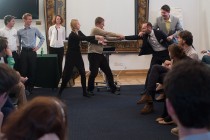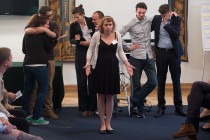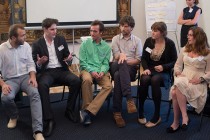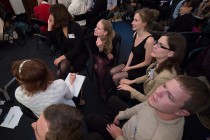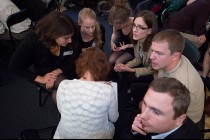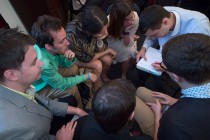
The 13th Visegrad Summer School was officially opened in Villa Decius on Monday, hosting 45 participants from 12 countries of Central and Eastern Europe.
„This is the school, where we know that freedom is not given for granted, but we have to take care of it every day” – said Danuta Glondys, director of Villa Decius Association, who welcomed the participants, special guests and partners of Villa Decius Association. She gave the example of Ukraine shortly after, saying we have to take solidarity with our Ukrainian friends, whose freedom is in real danger.
Magdalena Sroka, the Deputy Mayor of the City of Krakow emphasized that after the European Parliament elections it is clearly visible, that the EU and Central Europe within is undergoing significant changes. „Common values – especially freedom and dignity - and a common platform are more than needed now” – she said, asking the participants of 13th Visegrad Summer School to work together on these common values.
„I wish you good thoughts, because we need good thoughts in Europe” – closed the series of welcome speeches Jacek Krupa, Member of the Board of the Malopolska Region.
„The limit of integration is the end of European Union”
The traditional inaugural lecture this year was held by Maciej Szpunar, Advocate General at the Court of Justice of the European Union in Luxemburg. Mr. Szpunar based his lecture on the concept of Sharing Europe, to talk about the current challenges of EU and the future of European integration.
„We must be open to the countries willing to share our values” – he said, talking about the question of development of the „European idea”, stating that the limit of integration would mean the end of the European Union. „From the other perspective, integration to European Union has to remain attractive for non-EU countries”- he added.
„Saying that Europe is in crisis does not provoke any denial” – continued Mr. Szpunar, noting that remaining open is not the easiest attitude to take on for EU and its member states these days. He explained that the financial crisis of the euro zone and the social and economic inequalities between member states all are all contributing factors to the lack of confidence in Europe. „EU is no longer sexy” – Mr. Szpunar concluded briefly the current state of European affairs, giving the headline for the Inauguration Day as this remark became the most highlighted sentence by the end of the day.
Mr. Szpunar also reflected on the strengthening voice of Eurosceptic parties in the European Parliament. Answering the question Solomiya Koshuluynska-Chuba VSS participant from Ukraine, he said: we must admit, that right-wing parties are a part of European heritage; they should be represented in the European Parliament. The possible positive impact of their presence would be the start of an effective and constructive discussion concerning the real problems and obstacles of further EU development, which would help strengthening the fragile legitimacy of EU.
Debating on V4
25 years after – on successes and challenges of V4 transformation – a debate took place with this title between diplomats of Hungary, Czech Republic, Slovakia and Poland, led by Krzysztof Bobiński, co-founder and publisher of Unia&Polska magazine.
“Can we actually work together?” –asked Bobiński, referring to the difficulties of the V4 cooperation hiding in the different social-economic status of the Visegrad countries and the different positions they have within the European Union.
After presenting the most important issues targeted during their countries’ V4 presidency, the participants of the debate came more or less to the same conclusion – although from different perspectives.
“V4 format makes our countries more competitive” – said Janusz Styczek, Deputy Director of the European Policy Department at Polish Ministry of Foreign Affairs. Anna Wisniewski, Counsellor of the Consulate General of Hungary in Krakow explained the economic dimension of Mr. Styczek’s remark, saying: V4 should be used as a brand, to bring the region more closer to those countries out on the global market, who has no knowledge of our countries so far. Ján Krivoš, First Secretary of the Emabassy of the Czech Republic to Poland had the same opinion, although he put an emphasis on the challenges of V4 being an alliance of four countries with four different policies. “It takes daily efforts and permanent discussion to overcome these differences” – he said. Answering a question from the public, Tomáš Kašaj, Consul of the Republic of Slovakia in Krakow said: “we need to work on the visibility of Visegrad cooperation to bring it closer to actual V4 citizens by creating initiatives having an effect on their daily life”.
Eszter Neuberger

